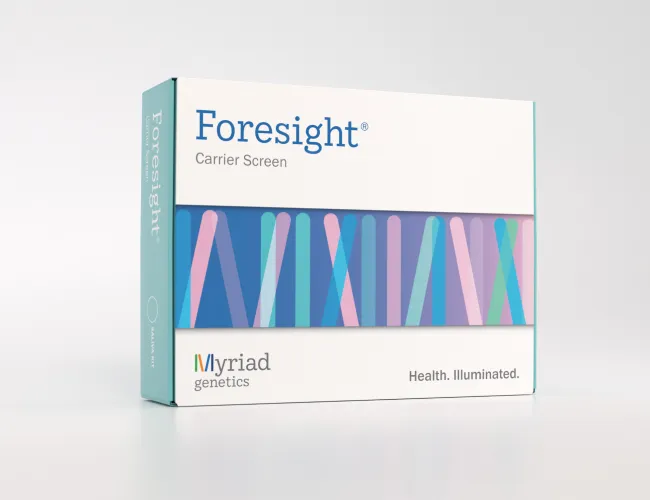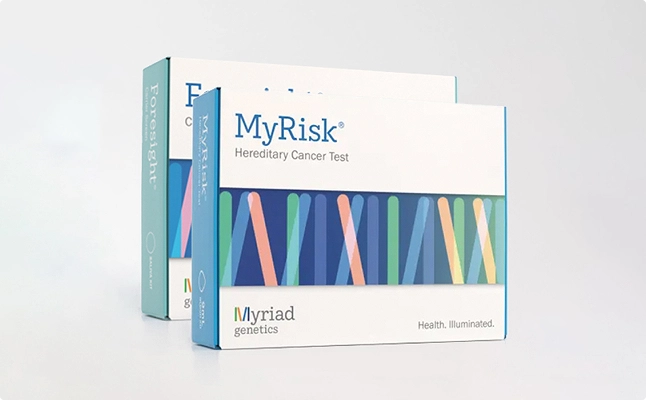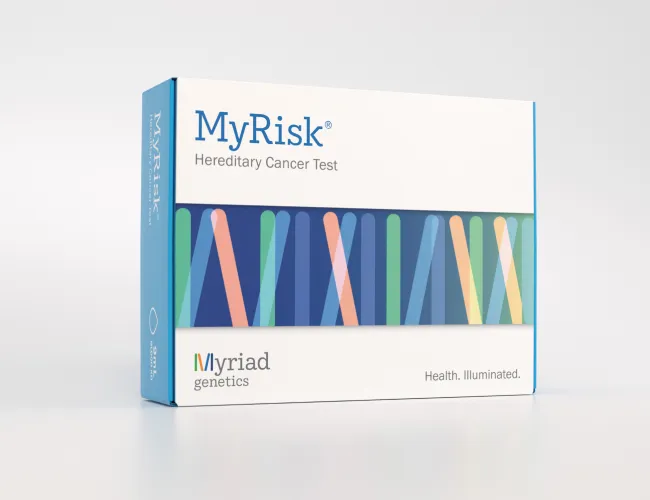In honor of Breast Cancer Awareness Month, jscreen is waiving its program fee for hereditary cancer tests all month.
Use code BCA2025 to save $10.
Get $10 off your Hereditary Cancer Test with code BCA2025
Order Now
Clear cost estimates from Myriad Genetics
1. Self-pay: $49 due now. (and $249 will be billed to you from Myriad Genetics). Nothing is billed to insurance. A customer service representative from Myriad Genetics will call you to collect credit card payment after you ship your kit back with the prepaid shipping label.
2. Insurance: $49 due now, the rest is billed to your insurance. If you select to pay for your test through insurance, a few days after Myriad Genetics receives your saliva sample, they will contact you via email and/or text to let you know your cost estimate.
Your estimate will consider:
- Your insurance plan
- How much of your deductible has been paid so far this year
- Any copays or coinsurance per your plan
- Eligibility for financial assistance
You will receive an email/text from a representative from Myriad Genetics notifying you that your estimate is ready to view. Most people will pay $0, but if your estimate shows you’ll have an out-of-pocket cost that creates a hardship, you have options which will be provided to you.
Who should consider taking this test
The Reproductive Carrier Screen is intended for people who are planning to start or expand their family and wish to know if they are at an increased risk of having a child with a genetic condition.
How long will it take to get results?
Test results are provided in an easy to understand report available within 3 weeks of the sample arriving at the lab. If an individual or couple learns that they or their future children are at risk for a genetic disease, a genetic counselor will provide options for family planning or medical care.
Will genetic testing be covered by my insurance?
Your cost for screening depends on several factors, including your insurance plan and any copay or unmet deductible. More than 80% of individuals pay $0 out-of-pocket because their insurance companies cover carrier screening.
Once the lab receives your kit, you will be sent a personalized cost estimate letting you know what your insurance is likely to cover, what your additional out-of-pocket costs are expected to be, and what your options are.
If your insurance does not pay for testing, you do not meet your policy’s guidelines for testing, you are uninsured, or you have a high unmet deductible, you can forgo insurance and directly pay a self-pay price of $249 for your carrier screen. If you cannot afford testing, there are financial assistance programs available for those who qualify.
Expanded carrier screening is for those who are pregnant or planning to have a biological child in the future. This test is designed to assess an individual or couple’s risk for having a child with a genetic disease. The panel includes more than 260 diseases, such as Tay-Sachs disease, cystic fibrosis, and sickle cell disease.
Results are most informative when both partners are screened; each person must register separately.

After you complete your registration and your kit is ordered, Myriad Genetics will send you the kit to collect your saliva sample.

And receive your kit by mail.

Collect your saliva sample from the comfort of your home.

Receive your results within 3 weeks after mailing the kit with the prepaid shipping label.

Schedule your virtual genetic counseling session.
.webp)
Actionable
Test results are provided in an easy to understand report available within 3 weeks of the sample arriving at the lab. If an individual or couple learns that they or their future children are at risk for a genetic disease, a genetic counselor will provide options for family planning or medical care.
Affordable
jscreen is committed to helping you access reliable and affordable genetic testing. Carrier testing is covered by most insurance plans and Myriad Genetics offers the option of affordable cash pay prices and financial assistance programs for those who qualify.
Peace of Mind
If an action plan is needed, a care navigator will work with you on a plan that fits your needs. You can feel confident knowing that the carrier screen offered through the jscreen program, is the only validated carrier screening panel in the US backed by 20+ peer-reviewed publications and >1.6M patients screened.
Find answers to commonly asked questions about our genetic testing and services.
Should I consider testing if I don't have a personal or family history of cancer?
Yes. The panel is appropriate for anyone interested in learning more about their hereditary cancer risks. While the chance of identifying a mutation may be lower, anyone can carry a change in a cancer gene. Individuals with Ashkenazi Jewish ancestry have a higher chance to carry a mutation in the BRCA1 and BRCA2 genes, even without a personal or family history of cancer.
Please note that without a personal or family history, insurance coverage is expected to be less likely.
If my health insurance company learns I am positive for a mutation in a cancer gene, will my insurance coverage or premiums change?
According to Genetic Information Nondiscrimination Act (GINA), health insurance companies cannot change your coverage, eligibility or premiums based on the results of your genetic testing or the health conditions in your family. Please visit www.ginahelp.org for more information and exceptions to the law as it can depend on the type of insurance and where you live.
Other types of insurance, such as life, disability and long-term care, do not have restrictions about using your genetic information to set their plans; each state has its own mandates regarding the use of genetic information. Please visit the National Human Genome Research Institute website for more information on the laws in your state.
Does jscreen offer compatibility/matching services?
jscreen does not provide compatibility services or anonymous matching. However, with consent from both partners, we can provide results to both partners together in a joint genetic counseling session or can provide a joint risk-assessment letter.
What is the hereditary cancer panel?
jscreen provides access to a cancer genetic testing panel that looks for mutations (or genetic changes) in 48 genes, such as BRCA1 and BRCA2, that are related to hereditary cancer. Each cancer gene on the panel is associated with specific cancer types and varying degrees of risk.
To view a complete list of genes on the panel, click here.
Should I consider testing if I have a current cancer diagnosis?
Yes. Genetic testing can help inform decisions about cancer treatments, including surgery, medications, clinical trials, and future surveillance. It can also be informative for other family members if a genetic risk is identified.
Note: please contact us HERE prior to registration if you have a current or past diagnosis of a hematological malignancy (blood cancer) or have received a stem cell or bone marrow transplant.




